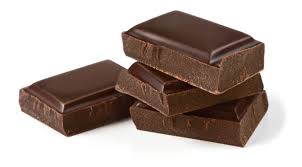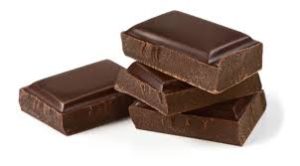 So far all the studies I've seen in the past 2 years about cocoa and chocolate have found various beneficial health effects from regularly eating small amounts of cocoa and chocolate. Now 2 new studies found benefits from the flavanols found in cocoa beans and chocolate. The studies found that consuming cocoa flavanols lowers blood pressure, increases flow-mediated vasodilation,improves blood cholesterol profile, and that regular dietary intake may reduce the risk of cardiovascular disease (CVD). However, note that chocolate and cocoa contain other compounds besides flavanols and these may also be exerting positive effects.
So far all the studies I've seen in the past 2 years about cocoa and chocolate have found various beneficial health effects from regularly eating small amounts of cocoa and chocolate. Now 2 new studies found benefits from the flavanols found in cocoa beans and chocolate. The studies found that consuming cocoa flavanols lowers blood pressure, increases flow-mediated vasodilation,improves blood cholesterol profile, and that regular dietary intake may reduce the risk of cardiovascular disease (CVD). However, note that chocolate and cocoa contain other compounds besides flavanols and these may also be exerting positive effects.
So now the question becomes, which chocolates have high levels of flavanols? Modern processing removes some of the flavanols - in fact, the more it undergoes processing, the more flavanols are lost. But it appears that dark chocolate and cocoa that has not undergone Dutch processing is best. According to a Medscape article on cocoa flavanols: "Traditional processing methods that yield "modern chocolate," especially alkalinization (dutching or Dutch processing, to mellow flavor), strips flavanols from cocoa. The bitterness from cacao mostly comes from flavanols. With the emerging recognition of the beneficial effects of flavanols there has been a shift in commercial production towards chocolate forms with high flavanol content." A recent study by Consumer Lab, which compared flavanol levels across many cocoa and chocolate products, also found that some chocolate brands were contaminated with cadmium (a toxic heavy metal), but that cocoa nibs had significantly lower levels. At any rate, the medical evidence does not support gorging on chocolate, but instead consuming chocolate or cocoa in moderation. From Science Daily:
Cocoa flavanols lower blood pressure and increase blood vessel function in healthy people
Two recently published studies in the journals Age and the British Journal of Nutrition (BJN) demonstrate that consuming cocoa flavanols improves cardiovascular function and lessens the burden on the heart that comes with the aging and stiffening of arteries. The studies also provide novel data to indicate that intake of cocoa flavanols reduces the risk of developing cardiovascular disease (CVD).
As we age, our blood vessels become less flexible and less able to expand to let blood flow and circulate normally, and the risk of hypertension also increases. Arterial stiffness and blood vessel dysfunction are linked with cardiovascular disease -- the number one cause of deaths worldwide....Cocoa flavanols are plant-derived bioactives from the cacao bean. Dietary intake of flavanols has been shown to have a beneficial effect on cardiovascular health but the compounds are often destroyed during normal food processing. Earlier studies have demonstrated that cocoa flavanol intake improves the elasticity of blood vessels and lowers blood pressure....These two studies in Age and BJN are the first to look at the different effects dietary cocoa flavanols can have on the blood vessels of healthy, low-risk individuals with no signs or symptoms of cardiovascular disease.
Cocoa flavanols increase blood vessel flexibility and lower blood pressure - In the study published in Age, two groups of 22 young (<35 years of age) and 20 older (50-80 years of age) healthy men consumed either a flavanol-containing drink, or a flavanol-free control drink, twice a day for two weeks. The researchers then measured the effect of flavanols on hallmarks of cardiovascular aging, such as arterial stiffness (as measured by pulse wave velocity), blood pressure and flow-mediated vasodilation (the extent to which blood vessels dilate in response to nitric oxide). They found that vasodilation was significantly improved in both age groups that consumed flavanols over the course of the study (by 33% in the younger age group and 32% in the older age group over the control intervention). In the older age group, a statistically and clinically significant decrease in systolic blood pressure of 4 mm Hg over control was also seen.
Improving cardiovascular health and lowering the risk of CVD - In the second study, published in BJN, the researchers extended their investigations to a larger group (100) of healthy middle-aged men and women (35-60 years) with low risk of CVD. The participants were randomly and blindly assigned into groups that consumed either a flavanol-containing drink or a flavanol-free control drink, twice a day for four weeks.
"We found that intake of flavanols significantly improves several of the hallmarks of cardiovascular health," says Professor Kelm. In particular, the researchers found that consuming flavanols for four weeks significantly increased flow-mediated vasodilation by 21%. Increased flow-mediated vasodilation is a sign of improved endothelial function and has been shown by some studies to be associated with decreased risk of developing CVD. In addition, taking flavanols decreased blood pressure (systolic by 4.4 mmHg, diastolic by 3.9 mmHg), and improved the blood cholesterol profile by decreasing total cholesterol (by 0.2 mmol/L), decreasing LDL cholesterol (by 0.17 mmol/L), and increasing HDL cholesterol (by 0.1 mmol/L).
The researchers also calculated the Framingham Risk Score -- a widely used model to estimate the 10-year cardiovascular risk of an individual -- and found that flavanol intake reduced the risk of CVD. "Our results indicate that dietary flavanol intake reduces the 10-year risk of being diagnosed with CVD by 22% and the 10-year risk of suffering a heart attack by 31%," says Professor Kelm.
The combined results of these studies demonstrate that flavanols are effective at mitigating age-related changes in blood vessels, and could thereby reduce the risk of CVD in healthy individuals. The application of 10-year Framingham Risk Scores should be interpreted with caution as the duration of the BJN study was weeks not years and the number of participants was around 100, not reaching the scale of the Framingham studies. That being said, Professor Kelm comments that "the reduction seen in risk scores suggests that flavanols may have primary preventive potential for CVD."
 Today a study was published finding health benefits to frequent (daily!) consumption of cocoa - improved walking in older persons with peripheral artery disease (PAD). Another reason to drink cocoa and eat dark chocolate!
Today a study was published finding health benefits to frequent (daily!) consumption of cocoa - improved walking in older persons with peripheral artery disease (PAD). Another reason to drink cocoa and eat dark chocolate!